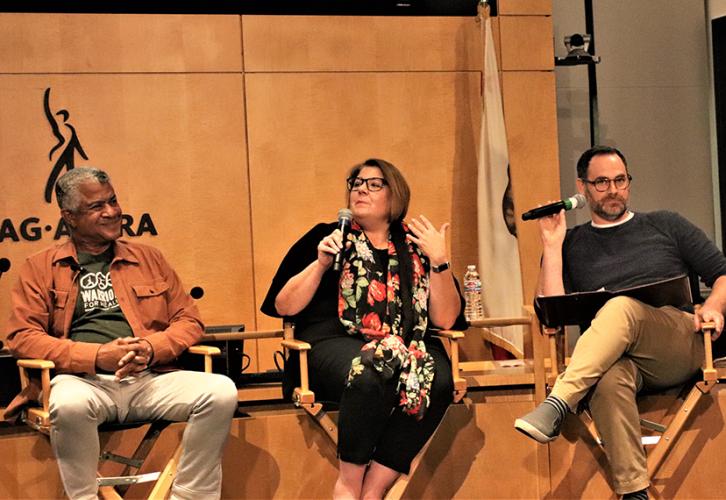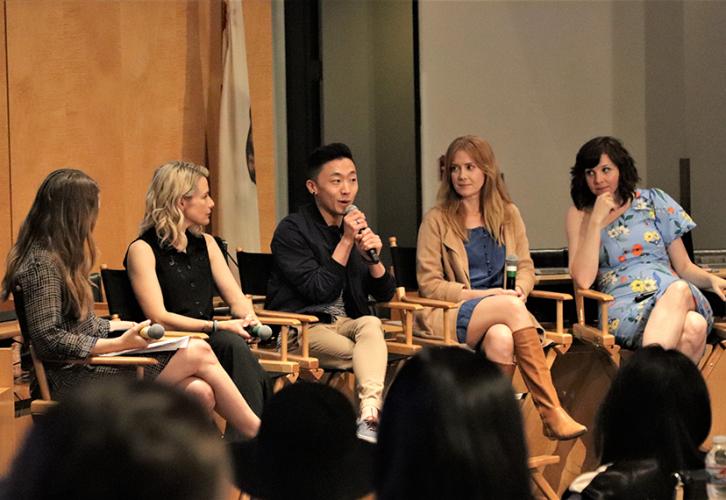
At a daylong series of panels at SAG-AFTRA Plaza on May 8, SAG-AFTRA L.A. Local members acquired a comprehensive understanding of mental wellness practice and learned about the resources available, particularly for performers. The event, titled Bringing Awareness and Coping Strategies to Mental Health, was organized by the L.A. Health Care Safety Net Committee to give members an opportunity to learn from mental health clinicians and fellow members about why actors tend to be predisposed to higher emotional sensitivity. It provided strategies they can use to help manage various mental health conditions and cultivate the greatest fulfillment in their lives and careers.
Attendees enjoyed three panels, complimentary lunch and a resource room with booths and representatives from organizations that provide aid to SAG-AFTRA members. The first panel featured mindfulness experts, including Dr. Helen Lavretsky, a professor in residence in the Department of Psychiatry at UCLA; master yogi and activist Akuyoe Graham; and breath-work teacher and intuitive healer Ana Lilia. Each emphasized the use of deep, controlled breathing to lower heart rate and reduce stress, and presented various studies and exercises for mental health through movement and meditation.
In the second panel, Village Counseling and Wellness Executive Director Suzette Bray, therapist and actor Chad Schwartzman, and actor Tucker Smallwood discussed performers’ unique proneness to mental health issues and ways to cope with them. Several aspects of performers’ lives, such as audition anxiety, competition and financial stability can agitate their already heightened emotions and exacerbate feelings of depression and stress. Panelists urged attendees in need to utilize the abundant resources available to them and, most importantly, to cultivate a support system and find activities unrelated to acting. This will provide a clean outlet away from the sources of imbalance while also adding a new level of purpose.
The final panel welcomed the host of the popular Audrey Helps Actors podcast, Audrey Moore; director of operations at the West L.A. branch of National Alliance on Mental Illness, Erin Raftery Ryan; Village Counseling & Wellness therapist Leigh Hall; and SAG-AFTRA member Mark Daughtery. Together, they examined the issues faced by today’s budding actors, including rejection, the shift from being a small-town big fish to big-town small fish, and the “despair-and–compare” trap induced by social media, especially when peers succeed. Jealousy, frustration and even the occasional pettiness are natural human reactions to have, panelists explained. Knowing how to analyze and deflate them is crucial to discovering the underlying issues so actors can work through them to be the best person they can be. Furthermore, they reiterated the second panel’s emphasis on developing purpose, friends and hobbies that bring joy outside of career.
Resources & Tips for Actors
Resources
- The Actors Fund fosters stability and resiliency and provides a safety net for performing arts and entertainment professionals. Services include emergency financial assistance, affordable housing, personal development workshops, health care and insurance counseling, senior care, secondary career development and more. Visit the Fund’s website and learn more.
- Motion Picture and Television Fund supports the entertainment community in living and aging well, with dignity and purpose, and in helping each other in times of need. MPTF’s team of medical professionals, therapists, counselors, staff members and volunteers work together to provide you with the support you need, when you need it. Assistance includes financial aid, medical support, community resources and continuing education. Click here to learn more.
- National Alliance of Mental Illness is the nation’s largest grassroots mental health organization dedicated to building better lives for the millions of Americans affected by mental illness. It offers aid to diverse groups of people with mental illness, including teens and young adults, veterans, members of law enforcement, the LGBTQ community, caregivers and family members, and those living with diagnosed conditions. Click here to visit its website and learn more.
- Village Counseling and Wellness is an outpatient program-based treatment center that helps individuals learn how to thrive in life. Its center combines evidenced-based treatments with a warm, supportive community that will help you build effective coping skills, teach you how to change behaviors, and challenge you to work through barriers that are holding you back from being the person you want to be. Click here to visit its website and learn more.
- Beacon Health Options offers clinical mental health and substance-use disorder management, a comprehensive employee assistance program, work/life support, specialty programs for autism and depression, and insightful analytics to improve the delivery of care. Click here to visit its website and learn more.
Panelists Tips
- Take 20 minutes a day to meditate rather than relaxing with music or TV. Disengage from the world by turning off electronics (including your phone) and practice deep breathing. Feel free to incorporate aromatherapy. Not only will this force you to S.T.O.P. — stop, think, observe, proceed with kindness — and consider your day, but it will slow your heartbeat and thus reduce stress and anxiety. If you are thinking, “Where do I find 20 minutes in the day?” then you are the perfect candidate for this exercise and should put in an effort to make the time for yourself.
- Yoga and tai chi are physical breathing and meditation exercises that also help with mindfulness, mood and memory recall.
- Pre-audition “two-step breathing” is a great pre- and post-audition nerve calmer that helps release sadness, disappointment and anger. Additional use of aromatherapy is a plus. To practice this exercise, find a comfortable place to sit, have your feet flat on the ground with your hands rested in your lap. Close your eyes and begin by taking two deep breaths in through your nose and exhale all at once through your mouth: breath, breath, exhale. You can visualize the base of the spine sprouting roots into the floor and traveling through every layer on earth until they reach the center of the earth and anchor you to the planet.
- Finding the best instructor for yoga, tai chi or meditation is as simple as trying different classes and seeing what you like. Often, first-timers can enjoy free passes or discounted rates.
- Your body is your temple. What you use to fuel it has a great effect on your mental health. You should replace fast food and high amounts of caffeine with healthier choices, fewer processed foods and minimal caffeine to help you feel and think well and reduce anxiety.
- Life outside acting was mentioned consistently throughout the day. Between the anxiety of auditioning, disappointment of not getting a role, excitement of getting one, jealousy of others’ success and endless other aspects of the performance profession, it is crucial to build purpose and a life outside of performing. Not only will doing so make you a multidimensional person, you will be more confident, happy and attractive to friends and to those for whom you audition.
- Volunteering and hobbies are a great way to meet new people and friends outside of your performing community. Volunteering is particularly great because you can meet like-minded people while honing a real purpose and activity outside your profession.
- Get help and don’t be afraid of needing it. If you need an outside neutral party to talk to, look at the resources above and do some research. There are plenty of low-cost and free counseling services available for you. Many psychology students with the same education as older therapists offer the same services at lower prices.
- Challenge yourself over the next month to check in with five loved ones, just to say “hello” and catch up.
- Build a community of five to 10 colleagues who are slightly ahead of you in their careers. This will give you tremendous perspective.
- Gain empowerment by allowing yourself to say “no” to roles that you do not want to do. For instance, if you are not a fan of the way a character is portrayed or prefer not to lose your accent for a role, just politely turn it down. No harm, no foul.
- Do not project what you think other people are thinking.
- Analyze your anxieties and, if you find yourself dwelling on a lack of spotlight after a successful career or period, resentful of friends’ successes or feel anxious about moving to a bigger city where there is greater competition, ask yourself why. In the end, actors choose the profession because it is their passion.
The products and services noted herein are provided as an informational service to SAG-AFTRA members and are administered by entities independent of SAG-AFTRA. Any questions must be handled by the provider. This information is not intended to serve as an endorsement nor is any warranty or guarantee implied.
Top photo: L.A. Health Care Safety Net Committee Chair L. Scott Caldwell and committee member Ellen Crawford pose with panelists master yogi and activist Akuyoe Graham, UCLA Department of Psychiatry professor-in-residence Helen Lavretsky and breath-work teacher and intuitive healer Ana Lilia, along with fellow committee members Joyce Guy and Maureen Sullivan at the May 8 event.
News
- Tags:
- Local News


